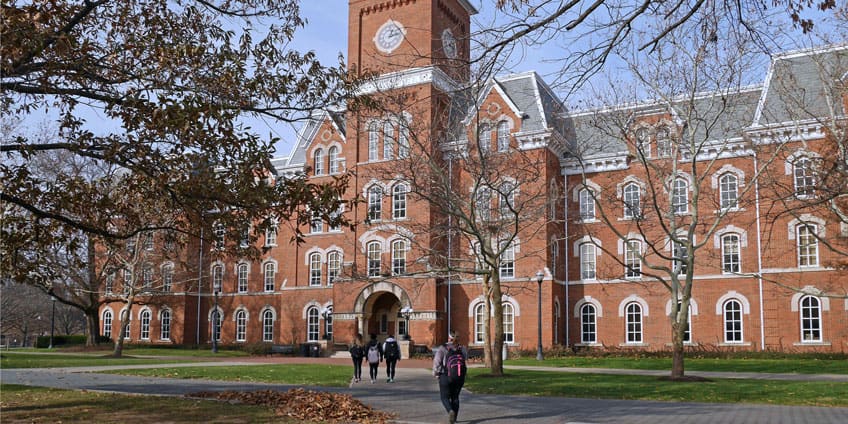
Let us figure out in the first place what the difference between a college and a university is. The principal difference between them is the following.
College offers:
- Undergraduate programs
- 2-year undergraduate program
- General disciplines/courses
- Associate degrees, certificates; rarely bachelor’s degrees
- Private and public (no difference)
- Generally smaller than university.
University offers:
- Undergraduate and graduate programs
- 4-year undergraduate program; 2-year graduate program
- Specialized disciplines/courses
- Bachelor's degrees; certificates, associates
- Private and public (no difference)
- Generally larger than college, may also be divided into colleges and departments.
Everyone tends to think that these completely different terms are interchangeable because people in the United States always use them synonymously. But as you may have figured it out, it is not entirely correct. Since the two concepts in question are quite divergent and represent absolutely different points. We will explore their difference further.
Keep in mind, in everyday conversational American English people prefer the term college instead of university, implying the latter variant. As you can see, in practical terms the whole picture looks somewhat complicated, although the difference is obvious.
Get More Insight into the Difference Between a College and a University
So what is the actual difference? First off, colleges don’t provide such a variety of options as universities, but usually only 2-year undergraduate program. And more often than not, there no master’s programs available, though there may be exceptions in some cases.
However, after successful completion of the 2-year course, a student may transfer to the university and continue to study there to obtain a bachelor’s degree. And then perhaps a master’s degree, if he or she wishes to do so. It is very convenient that any student has an opportunity to transfer to another school. Besides, this practice is very popular among US students.
The most significant difference probably lies in the specialization. Community colleges provide more general knowledge. Let us take, for instance, the vast field of science. Often, in this type of institution professors teach general science and its more generic aspects. Consequently, students learn fundamental information and acquire only basic knowledge, but not the profound expertise in the particular subject like in engineering.
Of course, degree levels also vary depending on the institution. In the case of college, associate’s, certificates, and sometimes bachelor’s degrees are available, which constitute a great difference in comparison with the university offers.
As it was mentioned at the very beginning, colleges are usually smaller than universities. But it is not always the case. And this by no means doesn’t define the status of the institution.
In its practical application, the word university implicates prestige. On the contrary, college generally doesn’t. According to Grammarist, despite this widespread belief, there are several highly reputable universities which continue to call themselves colleges to the present day. For instance, Dartmouth College. Do you wonder why? They adhere to that term because of a long-time tradition. Moreover, representatives of this institution have no intention of changing it. And it is hard to believe that the difference in the title may transform the way people used to think of this educational establishment.
College vs. University: What Else Should You Be Aware of?
On the contrary, the university offers both undergraduate (4-year degree) and graduate programs (2-year degree). Plus, it has postgraduate options and many others.
While studying there, students receive more profound knowledge that allows them to become competent and skilled specialists in the chosen field. That is the main reason why its majors and courses are more specific and detail-oriented. It is definitely true that students have great chances to become well-qualified and successful professionals in the future.
Among other things, this type of institution is usually involved in different sorts of researches by which professors along with their students strive to tackle various global problems. They choose to make the difference in our ever-changing world. And which is more important, they have the appropriate conditions to find a practical usage to their groundbreaking ideas.
At multiple universities bachelor's, master’s and doctoral degrees are common practice. The difference is evident since bachelor’s degrees for undergraduate programs appear to be the main option, though sometimes various kinds of certificates may be provided as well.
Note, there is a number of schools within one university. It may be divided into colleges and departments depending on academic courses. For instance, one may attend the University of Boston, and be enrolled in the Business College.
Another interesting fact is the following. Most people think that it is harder to get into university. And in most cases, that point of view is fair enough. But, of course, this doesn’t apply to every institution. There are some exceptions, as always. College entry requirements may be as demanding as in other institutions of higher education.
To summarize, it is essential to understand what the difference between a college and a university is to make the proper decision when needed. They both have pros and cons, its positive and negative aspects, that is why choose mindfully since this choice may define your path in the future. We hope the difference is clear now. So you can use these terms in various situations consciously. Be informed and keep learning!

